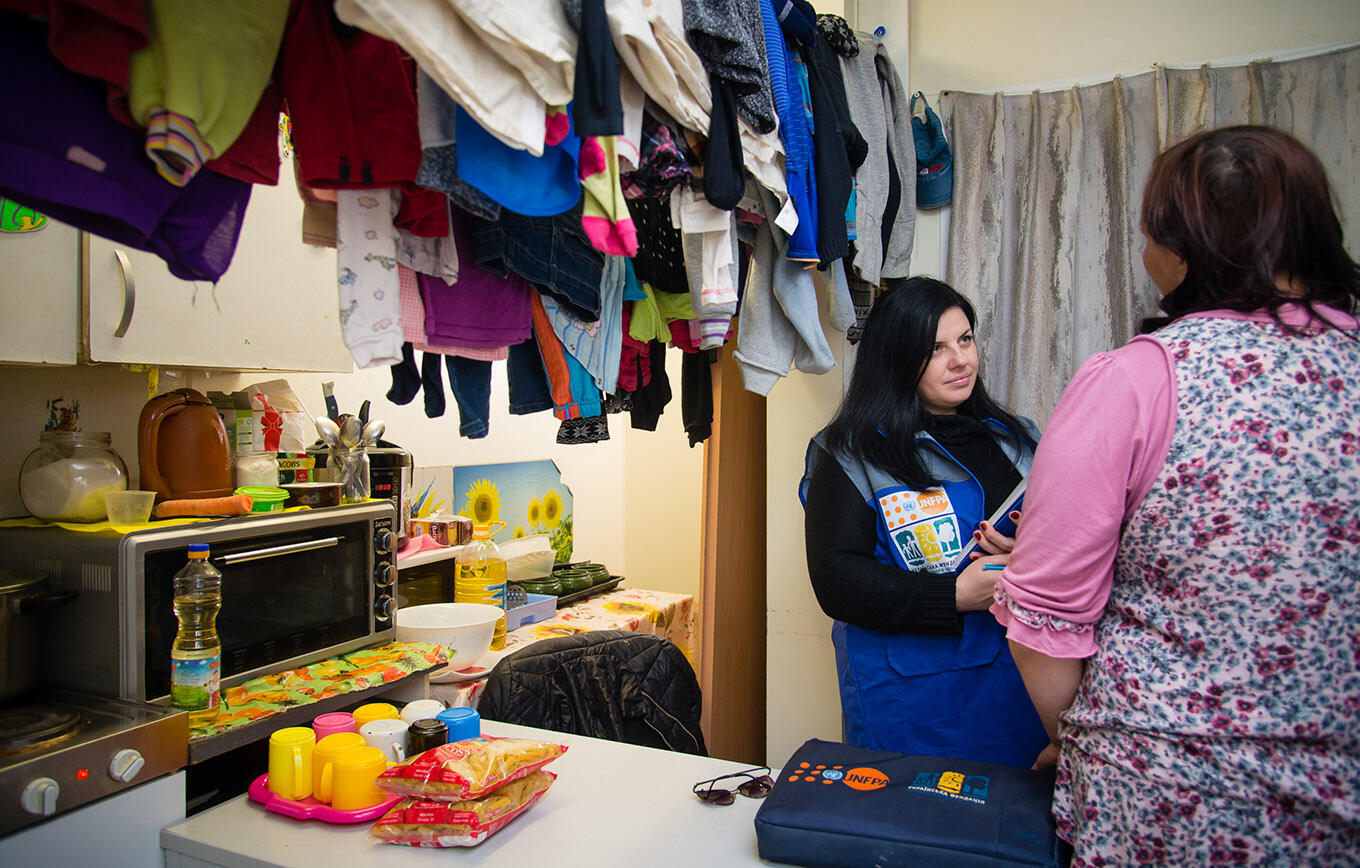KHARKIV, Ukraine – Driven from their home in Donetsk by threats and attacks after conflict erupted in eastern Ukraine, Tetiana* and her family hoped to restart their lives in a new city, but the tensions of the past followed them. Traumatised by the torture and abuse he endured in Donetsk, Tetiana’s husband became panicked and aggressive towards his family.
When psychologist Svitlana Tevantseva first met Tetiana, the 38-year-old was living with her nine children in a small settlement for internally displaced persons (IDPs) in Kharkiv. Tetiana was initially reluctant to talk about her experience in Donetsk, or to receive any kind of assistance. This is common for IDPs, according to Tevantseva, who co-ordinates one of UNFPA’s 26 mobile teams offering psychosocial support to vulnerable people, particularly survivors of gender-based violence, in hard-to-reach places impacted by Ukraine’s conflict.
Slowly, though, Tetiana began to reveal her story. She and her husband used to live happily in their own home in a rural part of Donetsk, farming and tending livestock, and raising their children. But when the conflict broke out, many of their neighbours and former classmates joined militant groups. Tetiana’s husband was also pressured to join, but he refused, saying he needed to take care of his family and their farm.
Several months later, militants kidnapped Tetiana’s husband, beating and abusing him over a period of days. Tetiana herself was targeted by militants while she was out walking with two of her children. They grabbed her hair, started to pull her across the street, and told the children to run back home. The armed men took Tetiana to their post and began to beat her, knocking out her front teeth and slashing her face, before ordering her and her family to leave town within four hours, saying they would kill her and her children the next day if she did not comply.
With only one car and nine children, Tetiana frantically called every hot line she could find, eventually lining up enough help to evacuate her family from Donetsk to Kharkiv that night.
Though they successfully moved away from the conflict, Tetiana’s husband remained haunted by what he had experienced in Donetsk. He constantly felt like he was being watched, and told Tetiana that their new home was not safe. After his paranoia turned into aggression, the couple eventually decided to separate temporarily to protect their children, and Tetiana’s husband moved in with his sister in another town.
When Tetiana initially encountered UNFPA’s mobile teams, the first thing she asked them was if they could help her find a new place for her and her children to live. She dreamed of them all being able to live in their own home again.
‘That was how we learned about Tetiana. It wasn’t until we asked her further about her life that we learned about her husband’s aggressive behaviour,’ Tevantseva says. When the mobile teams, each consisting of a social worker, a psychologist, and an outreach psychologist, come to talk to affected people, they often insist that they don’t need any help. But over multiple visits, the teams try to gain their trust and clarify what kind of support can be provided.
Women, children, and people with disabilities comprise a majority of the IDPs who have fled the armed conflict in eastern Ukraine. To try and address the needs of these vulnerable populations, UNFPA in November 2015 launched a project in five most affected oblasts in eastern Ukraine (Dnipropetrovsk, Donetsk, Luhansk, Kharkiv, and Zaporizhzhia). The mobile teams operate within the framework of this project, ‘Response to the acute humanitarian needs of the most vulnerable women and adolescent girls affected by the armed conflict in eastern Ukraine’, with support from the Ukrainian Foundation for Public Health and HealthRight International in Ukraine. As of November 2016, more than 10,000 survivors of gender-based violence in 307 locations have received much-needed support.
Tevantseva and the other members of her mobile team talked to Tetiana about what was happening to her husband, and how his mental state had been affected by the suffering the family had had to endure. They emphasised how important it was for both her and her husband to receive professional help in taking care of their mental health, and the importance of making sure their children’s psychological and emotional needs are also attended to.
Referring families to needed services is one of the main goals of UNFPA’s mobile teams. Tevantseva’s team connected Tetiana with the Kharkiv association of large families, ‘AMMA’, and with a public organisation that helped her find a permanent home in the Kharkiv region. Knowing she will have a stable home for her family, where they can live, farm, and keep cows again, has been a huge boost for Tetiana’s morale, according to psychologist Tevantseva.
Home for Tetiana and her family is now a village located 70 kilometres from Kharkiv. Since the village’s population is ageing rapidly, the young family has been welcomed happily to the community. Tetiana no longer feels alone, and has even started to help other families in similar situations.
—Olha Vesnianka
* Name changed to protect identity.


